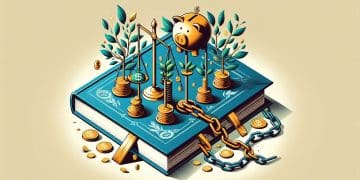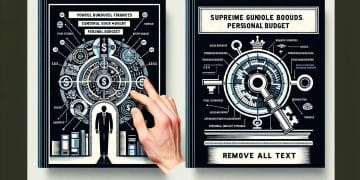Master Personal Budgeting: Ultimate Guide to Financial Freedom


In an era where financial stability seems increasingly out of reach, mastering the art of personal budgeting has never been more vital. Despite the wealth of resources available, many people find themselves struggling to manage their money effectively. Building a personal budget isn’t just a practical financial skill; it’s a source of empowerment. By learning to live within one’s means, reducing stress, and working toward achieving financial goals, budgeting becomes a life-enhancing habit.
Anúncios
Budgeting is more than just a method to manage finances; it’s a fundamental aspect of achieving financial independence. A well-structured budget lays the groundwork for financial freedom. It acts as a roadmap, enabling individuals to allocate resources wisely, keep debts at bay, and save for future aspirations. Crafting and maintaining an effective budget demands dedication, discipline, and the right set of tools. This article explores personal budgeting, offering valuable tips and strategies to place financial control in your hands.
Understanding the concept of personal budgeting involves acknowledging its crucial role in financial planning. Whether you’re saving for retirement, purchasing a home, or simply trying to make ends meet, budgeting forms the backbone of all financial decision-making. A personal budget is a financial plan that specifies how income is distributed. It encompasses expenses, savings, and debt repayments, serving as a tool for efficient money management and informed financial choices. By maintaining a budget, you gain valuable insights into your spending habits, paving the way for better decision-making.
To craft a personal budget, the initial step involves determining your monthly income. This figure includes all income streams, from your regular salary to side earnings, rental income, and dividends. Knowing your total income is the first step in planning expenses realistically, ensuring that overspending does not occur. The next phase involves tracking monthly expenses by categorizing them into various types such as housing, utilities, groceries, and discretionary spending. This categorization helps reveal spending patterns and areas where costs might be trimmed.
Differentiating between needs and wants forms a fundamental aspect of budgeting. Needs signify essential items like housing and groceries, while wants include non-essentials like dining out or entertainment. Prioritizing needs ensures financial discipline, allowing funds to be freed up for savings or debt repayment. Setting financial goals aligns with your broader financial objectives, such as saving for an emergency fund, retirement, or a new home. Implementing these goals with actionable steps can guide your budget effectively.
Regular monitoring and adjusting your budget are key to maintaining financial health. Your budget should evolve with changing financial circumstances, such as fluctuations in income or unexpected expenses. Tools like budgeting apps simplify the process, making it easier to stay on track and informed of your financial status. Avoid heavy constraints that make budgeting feel burdensome; allow room for occasional indulgences to maintain motivation and morale. Any surplus income should be channelized toward goal achievement or savings.
Overview of Personal Budgeting
Personal budgeting is the cornerstone of financial management, involving the strategic allocation of income toward various financial commitments. The primary aim is to ensure expenses align with income while leaving room for savings. It offers insight into spending habits, encouraging informed decision-making. The process includes setting short-term and long-term financial objectives, identifying essential expenses, and keeping a check on discretionary spending. With the right approach, personal budgeting paves the way for financial stability and independence.
Beyond just tracking expenses, personal budgeting offers a framework for achieving financial targets. By analyzing income and spending habits, individuals can identify areas for improvement. The goal is not just to restrict spending but to maintain a balanced approach, allowing for both saving and some level of enjoying life. Regularly revisiting the budget ensures that financial goals are updated and realistic. Even irregular expenses should be planned for, and having an emergency fund ensures stability during unexpected financial challenges.
Several tools and apps can simplify the act of budgeting by automating income and expense tracking. They relieve the user from manual inputs and calculations, making budgeting accessible and less time-consuming. Such digital helpers also provide insights and reminders, ensuring you stay aligned with your budgetary goals. Establishing an emergency fund covering expenses for 3-6 months adds a layer of security, cushioning the impact of unforeseen events like job loss or medical emergencies without disrupting your budget.
Key Characteristics of Personal Budgeting
- Understanding income and tracking expenditure.
- Classification of expenditures into needs and wants.
- Setting actionable financial goals.
- Regular monitoring and flexibility for adjustments.
- Utilization of digital tools to aid in budgeting.
Benefits of Personal Budgeting
Mastering personal budgeting holds numerous perks, primarily securing financial peace of mind. By gaining control over expenses, it becomes easier to reduce financial stress and focus on achieving financial goals. It allows you to prepare for the unexpected, easing cash flow management and debt reduction. Over time, disciplined budgeting fosters an ability to save, enhancing financial security for both the short and long term. With proper budgeting, the path to financial independence becomes clearer and more attainable.
There is significant empowerment derived from understanding precisely where your money goes each month. Transparency in financial matters fosters trust among household members and builds a shared vision of financial goals. It creates an enabling environment for open discussions regarding financial priorities and plans. Ultimately, the sense of control gained from budgeting translates into a disciplined life approach, where financial decisions are made consciously and deliberately.
Moreover, budgeting is a skill that keeps evolving and improving with practice. Every financial decision impacts the overall financial picture, and being consistently attuned to these decisions shapes better spending habits. The removal of unnecessary expenditure frees up resources that can be redirected towards savings or investments, bolstering financial growth and security. Beyond individual or household finances, budgeting skills can translate when applied to business or organizational financial management.
Embarking on a budgeting journey requires patience and perseverance. It does not promise immediate satisfaction but assures long-term rewards for those who remain committed. Avoiding common pitfalls like underestimating expenses or being overly restrictive ensures sustainability in budgeting efforts. In return, a well-maintained budget offers clarity, direction, and a deeper understanding of personal and financial aspirations. The lessons learned and habits formed through consistent budgeting efforts are life-changing.
Facing financial shortcomings or setbacks may tempt people to stray from their budget. However, staying the course leads to resilience and adaptability in the face of financial challenges. Every budgeting error is a stepping stone toward improvement; adjustments made in response to previous mistakes strengthen the overall budgeting framework. In essence, mastering personal budgeting transforms financial practices, aligning them with life’s bigger picture goals. By embracing personal budgeting, not only do you take charge of your finances, but you also elevate your potential for financial serenity and self-sufficiency.
- Reduced financial stress
- Preparedness for unexpected expenses
- Improved financial security and independence
- Enhanced understanding and control of finances
- Opportunity to build savings and investments





